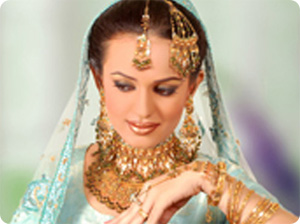Kashmiri Pre Wedding Rituals

Wedding is all about merriment and cheerfulness. However to make the day a perfect one, hectic preparations and organizations mark the preparation phase of the weddings and Kashmiri marriage is no exception. Before tying the nuptial knot on the actual day, there are a number of ceremonies that are performed. These traditions practiced are termed as pre-wedding rituals. These traditions are important, as they lay the foundation for the celebration due to take place on the D-Day. Right from livun & wanwun (which involves the process of sanctifying the house), to maanziraat ceremony (wherein beautifying of the door of the homes and application of henna is done) to the devgon ceremony (which marks the transition phase of both the bride ands the groom from the brahmacharya stage to grihastha stage) is performed. To get in detail information about each of the above mentioned rituals, read through the following lines.
Kashmiri Pre Wedding Customs
Livun & Wanwun
Livun is a ceremony in which the entire house is cleaned before the wedding. It takes place at the bride as well as the groom's house. It involves cleaning and treating the Kashmiri mud house floors with a mixture of cow dung, mud and water. All married females in the family witness this ceremony. On this day, the family cook also known as waza arrives and places a mud-and-brick oven called war in the house backyard. It is this place, where all traditional meals are cooked for the celebration of various wedding ceremonies. Wanwun are the music sessions that take place during the evening time at the bride as well as the groom's house. Close relatives and friends participate actively in this joyous function.
Maanziraat Ceremony
The maanziraat ceremony usually happens 1 week prior to the wedding. It starts with krool khanun, a ceremony that involves beautifying the door of the homes of the bride and the groom. This is followed by the bride's bathing ritual, in which the girl's maternal uncle washes her feet. It takes place in the evening. Thereafter, the girl's eldest aunt adorns her hands and feet with maanz (henna). All invitees are served a delicious Kashmiri meal. Thereafter, everybody participates enthusiastically in the wanvun or music session.
Devgon & Duribat
The Devgon ceremony symbolizes the transition of the bride and the groom from brahmacharya stage to grihastha stage. Before performing this ritual, the close relatives of both the families observe a fast. The purohit conducts the ceremony in front of the holy fire. The ornaments and utensils that the bride's parents wish to give to their daughter are also placed. An important custom is the kanishran, in which the boy/girl is bathed with a mixture of water, rice, milk and curd. Flower petals are also showered on the bride/groom. Thereafter, they are dressed up in new traditional clothing. Duribat ceremony takes place on the same day as that of Devgon. Usually, it is attended by the bride/groom's maternal relatives. Traditional vegetarian lunch is served. Also, it involves exchanging of gifts.
| |
Other Categories
Kashmiri Pre Wedding Rituals
Kashmiri Wedding Rituals
Kashmiri Post Wedding Rituals
Main Categories
Indian Weddings
Wedding Decoration Tips
Pre Wedding Functions
Post Wedding Functions
Hindu Marriages
Indian Wedding Day Functions
Muslim Wedding Ceremony
Malayalee Wedding Ceremony
Kannada Wedding Ceremony
Kashmiri Wedding Ceremony
Oriya Wedding Ceremony
Tamil Wedding Ceremony
Bengali Wedding Ceremony
Punjabi Wedding Ceremony
Jain Wedding Ceremony
Maithil Brahmin Wedding Ceremony
Sindhi Wedding Ceremony
Telugu Wedding Ceremony
Maharashtrian Wedding Ceremony
Assamese Wedding Ceremony
Jewish Wedding Ceremony
Marwari Wedding Ceremony
Buddhist Wedding Ceremony
Gujarati Wedding Ceremony
Planning Your Honeymoon
Indian Bride
Indian Groom
Indian Wedding Features
Marriage Problems
Indian Wedding Preparation
Indian Wedding Planners
Post Wedding Preparation
Main Day Function
|

